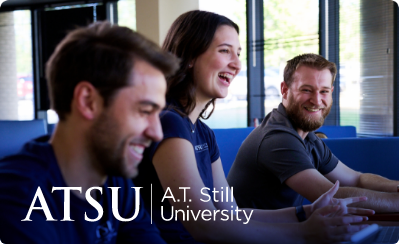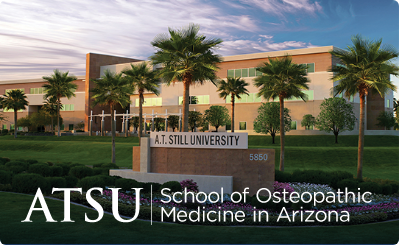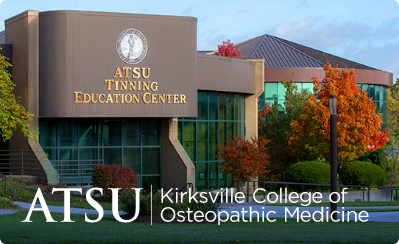Request Information
QUICK LINKS:
Impact by the numbers How we do it Why it matters Who benefits Who qualifies Hometown Scholars Contact ATSUPartnerships to serve the underserved
A.T. Still University (ATSU) advances its mission to serve the underserved through a robust network of strategic partnerships across the nation. By collaborating with community health centers, hospital systems, and academic institutions sharing our commitment to whole person care and health equity, together we are building a healthier future for communities where the needs are greatest.
How we do it
ATSU’s partnership model is action-oriented and grounded in community-based solutions. Through a series of integrated strategies, ATSU supports workforce development, strengthens local health infrastructure, and provides students with immersive, real-world education experiences.
Mission-driven education: ATSU is guided by its heritage and principle: First in Whole Person Healthcare.
Strategic partnerships: In collaboration with Community Health Centers (CHCs), Primary Care Associations (PCAs), and the National Association of Community Health Centers (NACHC). Hospital systems and academic institutions that share our commitment to whole-person healthcare and health equity. ATSU’s model embeds clinical education directly into community health settings. Together, we are building a healthier future for communities where the needs are greatest.
Hometown Scholars: ATSU’s Hometown Scholars program has a “grow your own” strategy designed to identify future clinicians from your community. The University collaborates nationally to recruit students from medically underserved rural and urban areas and partners them with CHCs to serve those communities after graduation. Sign up
Recruitment fairs: Engage dental and PA students in-person and virtually. Sign up
Residency fairs: Teaching Health Center Primary Care Residency Programs, engage 3rd-year medical students before the match and auditions. Sign up
Addressing provider workforce gaps: ATSU develops sustainable community-integrated solutions to reduce recruitment burdens and improve access to care.
Why it matters
A resilient healthcare system starts with strong, community-rooted providers. However, many CHCs face persistent workforce challenges that limit their ability to meet patient needs. ATSU’s partnership approach delivers a sustainable solution.
FQHCs and CHCs face significant challenges:
- Physician shortages in underserved areas
- Long-term workforce sustainability needs
- Pressures to demonstrate mission impact
- Demand for culturally competent, local providers
ATSU provides a proven solution: A workforce pathway that grows from your community, stays in your community, and serves your community.
Impact by the numbers
ATSU’s partnerships have delivered measurable outcomes that support CHCs, elevate education, and improve care in vulnerable communities. From the number of graduates serving in rural areas to program recognitions, these results speak volumes.

ATSU OVERALL IMPACT:
- 62% of ATSU physician and physician assistant alumni practice in an underserved area in 2024
- 73% of ATSU Hometown Scholar physician and physician assistant alumni practice in an underserved area in 2024
ATSU Provider Access and Impact Research, Mullan Institute 2025, George Washington University.

ATSU-SOMA OVERALL IMPACT:
- No. 1 Most graduates practicing in primary care fields
Rankings according to U.S. News & World Report, 2025 Source: atsu.edu/usnews.

ATSU-KCOM OVERALL IMPACT:
- No. 1 Most graduates practicing in rural areas
- No. 6 Most graduates practicing in medically underserved areas
- No. 6 Most graduates practicing in primary care fields
Rankings according to U.S. News & World Report, 2025 Source: atsu.edu/usnews.
Discover how collaboration strengthens community health
A strategic partnership between ATSU and community health centers (CHCs) fosters a powerful synergy benefitting all stakeholders, from individual students to the broader national healthcare landscape. This collaboration, rooted in a shared mission to serve the underserved, fosters a new generation of community-minded healthcare professionals, enhances the quality of care in high-need areas, and strengthens the very infrastructure of community health.
Who benefits from a partnership?
Partnerships with ATSU create a multi-directional impact: enriching student education, improving patient care, and expanding workforce pathways for healthcare organizations. Here’s how each group gains:

Equip the next generation with an unparalleled learning environment
By learning in CHCs, ATSU medical, dental, and physician assistant (PA) students gain firsthand experience in providing care to rural and urban medically underserved populations. This real-world application of their education allows them to develop clinical skills under the mentorship of experienced CHC providers, fostering a deep understanding of the social determinants of health and the unique challenges faced by these communities.
This immersive experience not only enriches their education but also often inspires them to pursue careers in community health centers, directly addressing the nationwide shortage of primary care physicians, PAs, and dentists in medically underserved areas.

Enable greater access to care and expanded health services
A partnership between ATSU and CHCs or local healthcare providers brings substantial, direct benefits to medically underserved communities. The core of the collaboration is designed to address health disparities and improve the well-being of communities.
Key partnership benefits for underserved communities:
- Increased access to care: The presence of students and resident physicians expands the clinic’s capacity, allowing more patients to be seen. This helps reduce wait times for appointments and makes it easier for community members to get the care they need when they need it.
- Expanded health services: These partnerships often enable clinics to offer a broader range of services, such as health education workshops, wellness screenings, and more specialized care, which might not have been possible otherwise.
- Focus on whole person, community-oriented care: Students are educated in ATSU’s philosophy of “whole person healthcare.” This means they learn to consider a patient’s lifestyle, environment, and other social factors, not just their physical symptoms, leading to more comprehensive and culturally sensitive care tailored to the community’s specific needs.
- Sustainable local workforce: A primary goal of this model is to build a long-term pathway for healthcare providers. Students educated in a community are more likely to return to practice there after graduation, helping address long-term provider shortages.
- Introduction of modern practices: University partners provide access to the latest evidence-based treatments and research, ensuring community care is of the highest quality.
- Emphasis on community-oriented primary care: A cornerstone of ATSU’s and CHCs’ missions ensure the care provided is culturally competent and tailored to the specific needs of the local community.

Strengthen your workforce and service delivery
Partner with ATSU to recruit, educate, and retain mission-driven clinicians. Community Health Centers (CHCs) benefit from academic affiliation with ATSU by attracting passionate healthcare professionals, enhancing quality improvement efforts, and establishing a recruitment pathway for future staff. Students who learn in a CHC are more likely to return to practice in that setting after graduation, ensuring a sustainable workforce for the future.
Through these partnerships, ATSU fulfills its founding mission while strengthening its educational offerings. Students are educated in real-world settings, programs gain national recognition, and new care models emerge to improve outcomes in rural and urban medically underserved communities.

A direct solution to the workforce crisis
Primary Care Associations (PCAs), which provide state and federal-level advocacy and support to Community Health Centers (CHCs), benefit from a strengthened workforce and improved quality of care through partnerships with ATSU. A successful collaboration between ATSU and a CHC may serve as a model for similar academic-community partnerships, amplifying public health impact across the state.
One of the core roles of PCAs is to advocate for CHCs and the communities they serve, while helping them to build and sustain a robust workforce.
Key partnership benefits for PCAs:
- A “grow your own” strategy: Through the Hometown Scholars program – developed with CHCs nationwide – PCAs and their members may identify and endorse promising local candidates for ATSU’s medical, dental, and PA programs. These individuals, educated within the CHC model, are more likely to return and serve their home communities, directly addressing provider shortages.
- Active PCA participation: PCAs are not passive participants. By submitting a formal letter of endorsement, PCA and CHC leaders help applicants gain consideration for admission interviews, playing an active role in developing the next generation of community-based providers.
- Enhancing member value through education and development: PCAs committed to supporting their CHC members may leverage ATSU’s professional development offerings as a member benefit, boosting engagement and long-term value.
- Upskilling the CHC team: We’re committed to boosting the capabilities of the CHC team. All CHC employees receive a 20% tuition discount on ATSU’s online graduate degrees and certificates (including leadership, MPH, MHA, DHA, DNP, and more!). This partnership is a powerful tool for recruiting, retaining, and developing leaders across PCA networks.
- Retaining top clinical talent: CHC providers who serve as preceptors for ATSU students receive no-cost CME and CDE credits, adjunct faculty status, and access to University library resources – valuable incentives for retaining high-performing clinicians.
- Strengthening advocacy with regional data: ATSU partnerships provide PCAs with outcome data, student success stories, and program impact metrics can strengthen policy advocacy and funding requests.
- A replicable model for collaboration: This partnership framework demonstrates how academic institutions and CHCs work together to solve workforce challenges and improve community health, giving PCAs a proven model to present to legislators and stakeholders.

Support its mission through collaborative workforce solutions
A voice for Community Health Centers (CHCs) across the country, National Association of Community Health Centers (NACHC) advances its mission by supporting partnerships between CHCs and academic institutions like ATSU. These collaborations directly benefit NACHC’s membership by addressing critical workforce challenges and strengthening the CHC model nationwide.
Key partnership benefits for NACHC:
- An educational model built for community health: ATSU’s curriculum is developed in collaboration with CHCs across the country to produce graduates who are fully prepared to work in community health settings from day one.
- Contextual learning: Unlike traditional models, ATSU embeds students within CHCs for their clinical education. This hands-on experience provides students with a deep understanding of the financial, cultural, and geographic challenges faced by rural and urban medically underserved populations.
- Aligned mission: ATSU’s programs are designed to educate providers for service in CHCs. The University’s philosophy of whole person healthcare aligns closely with the CHC mission to serve rural and urban underserved populations.
- A direct solution to the workforce crisis: The ATSU and CHC partnership was built to solve a top challenge facing NACHC members: recruiting and retaining qualified, mission-driven providers.
- A “grow your own” strategy: The Hometown Scholars program – a core component of the NACHC, ATSU, and CHC alliance – empowers CHCs to identify and endorse local individuals for medical, dental, and PA roles. These future providers are more likely to return to serve their communities, developing a sustainable, culturally connected workforce.
- Evidence of impact: The Hometown Scholar pathway, combined with measurable health improvements in underserved communities, strengthens the case for the effectiveness of the CHC model.
- Stronger national advocacy: These partnerships generate real-world success stories and outcome data can support NACHC’s advocacy efforts for increased and sustained funding for CHCs nationwide.
An ATSU and CHC partnership is a mutually beneficial alliance leveraging each organization’s strengths to tackle some of the nation’s most pressing healthcare challenges. It can stand as a model of collaborative benefit, helping build a healthier, more equitable future.
Who qualifies to be a partner?
Consistent with ATSU’s mission, a qualifying partner is typically a healthcare organization providing high-quality clinical education for students while sharing a commitment to serving rural and urban medically underserved populations. The goal of these partnerships is to provide meaningful, hands-on learning experiences reinforcing ATSU’s philosophy of whole person healthcare, while addressing workforce challenges in medically underserved communities.
Potential partners include:
- CHCs and federally qualified health centers: These are ideal partners because their core mission is to provide comprehensive primary care to medically underserved communities, regardless of patients’ ability to pay.
- Hospitals and healthcare systems: These entities are a good match, along with their strong outreach mission and service to medically underserved communities.
- Government healthcare facilities: These facilities include organizations like the Indian Health Service and the Veterans Administration.
- Rural health clinics: These clinics are located explicitly in medically underserved rural areas, making them ideal partners for exposing students to the unique challenges and rewards of rural medicine.
- Specialty clinics and nonprofits: Organizations focusing on specific needs, including behavioral health, and dental services in medically underserved communities, align well with ATSU’s holistic approach to health.
Hometown Scholars Program: A strategic alliance to cultivate mission-driven healthcare leaders
ATSU’s Hometown Scholars program is a strategic initiative developed in collaboration with CHCs, PCAs, and NACHC. The strength of our nation’s healthcare safety net depends on the dedicated individuals who choose to serve where they are needed most.
This program is designed to directly address the workforce challenges faced by CHCs and help cultivate the next generation of healthcare leaders from within the communities they serve. More than just a program, Hometown Scholars is a long-term workforce development strategy providing a clear pathway for passionate individuals who are connected to their community and committed to the mission of improving community health outcomes.

ATSU-SOMA Student and Hometown Scholar
By identifying, mentoring, and supporting aspiring medical, dental, and PA professionals from local communities, this partnership helps build a stronger workforce and a healthier future – one provider at a time.
The success of the Hometown Scholars program depends on shared responsibility and active engagement from all partners. CHCs, PCAs, and NACHC each play a vital role in building and sustaining a thriving collaboration.
Key pillars include:
- Targeted recruitment: Work in partnership with ATSU to identify promising candidates from your patient populations, staff, their families, and local colleges and universities. This “grow your own” approach ensures students are academically prepared and deeply committed to the needs of your community.
- Reduced recruitment costs: Developing local talent significantly lowers the time and expense of recruiting out-of-area providers who may be less likely to stay long term.
- Enhanced clinician retention: Hometown Scholars are more likely to return to practice in their home communities, bringing a sense of purpose and a desire to give back.
- Strengthening the primary care pathway: The program encourages students to pursue primary care careers through mentorship and clinical rotations in community health settings.
- Alignment with national goals: Hometown Scholars aligns with the workforce development priorities of NACHC and state-based PCAs, contributing to a national effort to strengthen and diversify the healthcare workforce.
ATSU views CHCs and PCAs as essential partners in the success of the Hometown Scholars program. The model is rooted in shared commitment and mutual support.
Partner responsibilities include:
- Nominate and endorse: Identify and support individuals from your community with the potential to become future healthcare leaders.
- Provide mentorship and guidance: Offer real-world insights through mentorship by your experienced clinicians and staff.
- Facilitate clinical experiences: Host students for hands-on learning at your health center, immersing them in the CHC care model from the start.
- Support scholar success: Consider helping endorsed students pursue financial aid through CHC, foundation, or state-based funding sources.
ATSU’s commitment to partners:
- A robust support system: Scholars receive academic advising, development opportunities, and peer networking throughout their journey.
- A platform for collaboration: Partners are connected with CHCs and PCAs across the country who are similarly invested in building a sustainable, community-rooted workforce.
ATSU partnership opportunities
Building a healthier future, together
The Hometown Scholars program is a testament to our shared belief that the future of community health lies in the communities themselves. By investing in local talent, we can cultivate a sustainable and passionate workforce dedicated to delivering high-quality, compassionate care to all.
We invite you to join us in this critical endeavor. Let us work together to empower the next generation of healthcare leaders and ensure the continued success of our nation’s CHCs.
Contact ATSU:
Learn more about how your CHC or PCA can partner with ATSU to provide clinical education to our medical, dental, and PA students or how you can endorse a student for the ATSU Hometown Scholars program.
REQUEST INFO


